B1 Unit 7 Text 2 英汉对照(原Unit9)
B1 Unit 7 Text 2 英汉对照(原Unit9)
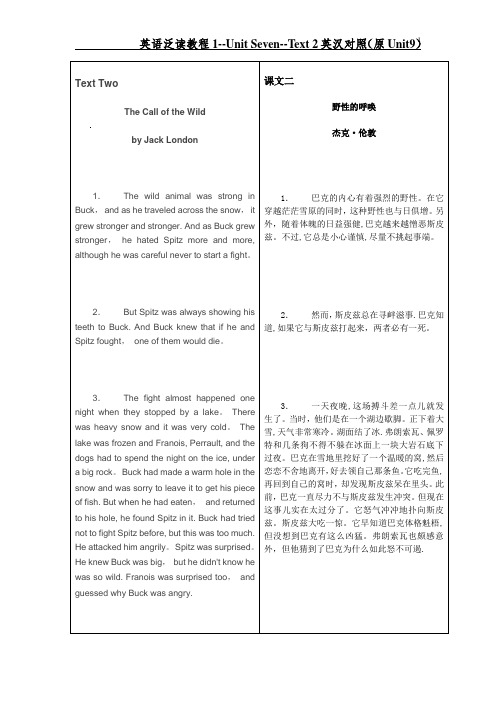
Text TwoThe Call of the Wildby Jack London1.The wild animal was strong in Buck,and as he traveled across the snow,it grew stronger and stronger. And as Buck grew stronger,he hated Spitz more and more, although he was careful never to start a fight。
2.But Spitz was always showing his teeth to Buck. And Buck knew that if he and Spitz fought,one of them would die。
3.The fight almost happened one night when they stopped by a lake。
There was heavy snow and it was very cold。
The lake was frozen and Franois, Perrault, and the dogs had to spend the night on the ice, under a big rock。
Buck had made a warm hole in the snow and was sorry to leave it to get his piece of fish. But when he had eaten,and returned to his hole, he found Spitz in it. Buck had tried not to fight Spitz before, but this was too much. He attacked him angrily。
B1 Unit 8 Text 1 英汉对照(原Unit8)

Text OneTwo Boxes of Gold (I)1.Herbert Blamyre was trusted one day with the urgent task of carrying two boxes of gold from London to Naples. On the way he came to know Levison and Major Baxter. Who were the two men? Was Herbert able to fulfill the task? Please read the following story for the answers.2.My name is Herbert Blamyre. I live with my wife, Minnie, in a little house to the south of London. We had only been married for a month, and had returned from a holiday in Ireland. I was a junior partner in a bank in Lombard Street, and had four more days of holiday left. Minnie and I were sitting in the garden, when the maid brought the telegram which was to start my adventures.3.The telegram was from my partner, Mr. Schwarzmoor. It said, "We want you to start for Italy at once on important business. No delay. Be at office by 6.30. Start from London Bridge by 9.15, and catch Dover night boat." 课文一两箱黄金(Ⅰ)1.有一天,赫伯特·布兰爱尔接到紧急命令,要他将两箱黄金从伦敦运到那不勒斯。
unit7 TextA 课文翻译
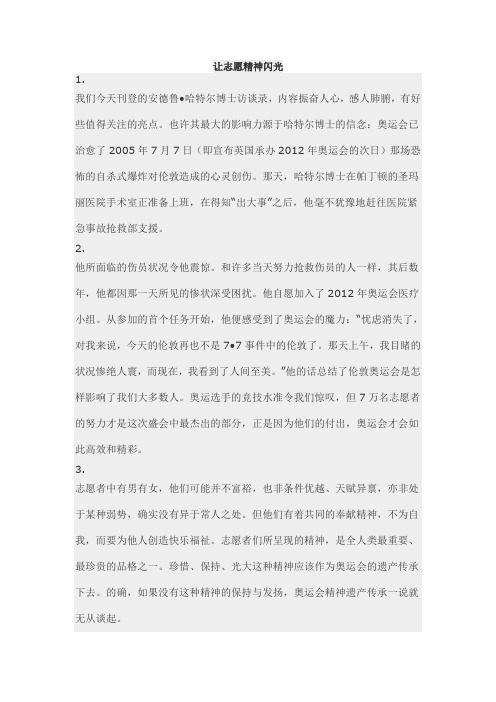
让志愿精神闪光1.我们今天刊登的安德鲁•哈特尔博士访谈录,内容振奋人心,感人肺腑,有好些值得关注的亮点。
也许其最大的影响力源于哈特尔博士的信念:奥运会已治愈了2005年7月7日(即宣布英国承办2012年奥运会的次日)那场恐怖的自杀式爆炸对伦敦造成的心灵创伤。
那天,哈特尔博士在帕丁顿的圣玛丽医院手术室正准备上班,在得知“出大事”之后,他毫不犹豫地赶往医院紧急事故抢救部支援。
2.他所面临的伤员状况令他震惊。
和许多当天努力抢救伤员的人一样,其后数年,他都因那一天所见的惨状深受困扰。
他自愿加入了2012年奥运会医疗小组。
从参加的首个任务开始,他便感受到了奥运会的魔力:“忧虑消失了,对我来说,今天的伦敦再也不是7•7事件中的伦敦了。
那天上午,我目睹的状况惨绝人寰,而现在,我看到了人间至美。
”他的话总结了伦敦奥运会是怎样影响了我们大多数人。
奥运选手的竞技水准令我们惊叹,但7万名志愿者的努力才是这次盛会中最杰出的部分,正是因为他们的付出,奥运会才会如此高效和精彩。
3.志愿者中有男有女,他们可能并不富裕,也非条件优越、天赋异禀,亦非处于某种弱势,确实没有异于常人之处。
但他们有着共同的奉献精神,不为自我,而要为他人创造快乐福祉。
志愿者们所呈现的精神,是全人类最重要、最珍贵的品格之一。
珍惜、保持、光大这种精神应该作为奥运会的遗产传承下去。
的确,如果没有这种精神的保持与发扬,奥运会精神遗产传承一说就无从谈起。
4.志愿精神对实现英国的美好未来至关重要。
大卫•卡梅伦提出的“大社会”观念虽未必引起公众共鸣,但本质上传递了一个极其重要的理念:我们不能也不应期待政府官员为我们包办一切。
政府没有也不应该拥有资源事事介入,包办一切;我们应能团结一致,作出奉献。
5.当然,英国人民在团结奉献方面已规模显著。
在全国各地,人们成立了各种团体:有的组织帮助儿童安全上学,有的辅导儿童提高读写技能,有的引导人们参与运动,还有的帮助减轻老人生活中的寂寞。
Unit 7 Text B1
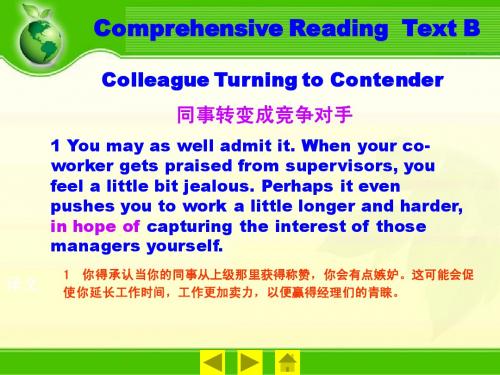
Comprehensive Reading
For example, a company can be organized around different brands, with each brand allocated resources, including a dedicated group of employees willing to champion the brand. Each brand manager is given responsibility for the success or failure of the brand and is compensated accordingly. 译文
现在有关工作的这个问题的争论仍然存在。 3 现在有关工作的这个问题的争论仍然存在。一些员工担心自己的同事得 到升职的同时,自己却被解雇了。竞争会产生这样的后果: 到升职的同时,自己却被解雇了。竞争会产生这样的后果:一些员工想方 设法打击自己认定的竞争对手。 设法打击自己认定的竞争对手。
Comprehensive Reading
最近对150名美国经理进行调查, 150名美国经理进行调查 译文 4 最近对150名美国经理进行调查,超过半数的人认为 雇员间的竞争比十年前普遍得多。 雇员间的竞争比十年前普遍得多。
prevalent
• • • • • • • • • • • • • 1. More than half of them said that competition among employees was more prevalent now than 10 years ago. prevalent a. 流行的,普遍的 e.g. Is malaria still prevalent among the population here? 疟疾是否仍为此地居民的多发病? e.g. The prevalent opinion is in favor of res are prevalent in some tropical countries. 在一些热带国家,眼疾很流行。 辨析: 辨析:prevalent 与 prevail prevalent 意为“经常出现,常见的,普遍的”, 如:Colds are prevalent in winters. 冬天普遍寒冷。 该词可强调在某时某地存在,如:Traveling by car has become more prevalent now. 现在乘小车旅行已经变得更常见了。 prevail 意为“流行的,盛行的,占主要地位的”, 如:These are the prevailing fashions at present. 这些是目前流行的款式。Green is the prevailing color in my bedroom. 我的卧室以绿色为基调。
unit72b翻译

The babies often die from illnesses and do not live very long.
死于疾病
ill– illness--illnesses
Adult pandas spend more than 12 hours a day eating about 10
kilos
of
bamb一oo天. 花M费a超ny过y1e2个ar小s 时ag吃o掉, t大h约er1e0千w克er的e 竹a 子lot
spend…doing…
more bamboo
forests and pandas in China, but then humans started to cut down
多得多的竹林和熊猫
居住
there will be a lot more pandas than now.
将会有
为…准备 醒了并且饿了 兴奋地跑过去 照顾 对某人来说特别 每隔两年 死于疾病 花费…做某事 生活在现存的森林里 一个教育项目 送某人到某地 拯救这些动物的重要性 制作艺术品 中国政府 其他的熊猫饲养员 另外大约200只very special to me.”
be special to sb. 对某人来说很特别
Lin Wei loves her job, but it is a difficult one.
job
Pandas do not have many babies, maybe only one every two years.
It is 8:30 a.m. at the Chengdu Research Base. Lin Wei and
the other panda keepers are preparing the milk for the baby
B1 Unit 9 Text 2 英汉对照

Shanghai Expo 2010 Turns Spotlight on Nations1 Two years ago, athletes from more than 190countries came together in Beijing, vying forinternational acclaim on basketball courts and balancebeams at the Summer Olympics. Now, a rematch of sortsis occurring in Shanghai —but this time, thecompetitors carrying their national flags are the architectsand designers of hundreds of pavilions at a 184-daymarathon of image and commerce, Expo 2010.2 The ultimate winners of this contest will be decidednot by referees with stopwatches or judges withscorecards but by the 70 million people —mostlyChinese —who are expected to attend the modernworld's fair before it ends Oct. 31. The impressions theytake away are likely to shape such decisions as wherethey will go on vacation, where they will study abroad,what countries their companies will do business with andeven what kinds of food they will eat.3 "While the Beijing Olympics gave china the chanceto host the world and show the world what China is, atExpo, the Chinese people are the guests and the variousnations are playing host, showing China what the worldis," said Urso Chappell, who runs Expomuseum .com, aWeb site documenting the history of such events, startingwith the 1851 Great Exhibition in London.4 "It's a great opportunity for countries to dispel oldmyths or create new ones," he added. "I doubt the averageChinese person ever thinks much about Luxembourg, forinstance, but they have a really playful pavilion, and that'sgoing to certainly leave a lasting impression on those whosee it."5 With a theme of "Better City, Better Life," theShanghai Expo is loosely organized around the idea ofsustainable development. There are "urban best practices"pavilions showcasing cities like Vancouver, BritishColumbia, and Hamburg and corporate pavilions fromcompanies like Coca-Cola and Cisco. But the mainattractions are the national pavilions, which range frommodest to imposing, simple to lavish, representational toabstract.6 Some, like Britain's, are the product of nationalcompetitions, significant government outlays and years ofplanning. Others, like that of the United States, werecobbled together at the last minute and funded by the private sector. Macao's is shaped like a rabbit. The United Arab Emirates' entry resembles a sand dune. Japan's has been nicknamed "purple silkworm island."7 By far the most buzzed-about pavilion among both architects and the public is Britain's "Seed Cathedral," designed by Thomas Heatherwick. The structure is a six-story cube pierced by about 60,000 thin, transparent rods that extend from it like porcupine quills and sway in the breeze. During the day, the rods —each 7.5 meters, or 25 feet, long —act like fiber-optic filaments, drawing natural light into the building. At night, they project light from inside the structure outward, making it glow like a spiky marshmallow. Locals have dubbed it "the dandelion."8 Each rod, moreover, contains seeds of different plants collected in the Millennium Seed Bank Project, an international conservation effort of the Royal Botanic Gardens.9 Before beating out architects including Zaha Hadid, John McAslan and Marks Barfield in the pavilion design competition, Mr. Heatherwick was perhaps best known for art installations.10 The British government is touting his project as "a striking, visual demonstration of the U.K. as a creative and innovative nation." Or, as Sir Andrew Cahn, director of U.K. Trade and Investment, which promotes Britain abroad, has said, it is an effort to show the Chinese that Britain is about more than "cobblestones and fog."11 At earlier world's fairs, the key draws were often exotic products from distant lands and gee-whiz inventions like the Ferris wheel and the alternating current system of electricity. In today's world of globalized trade and rapid communications, some architects say, there is a higher premium on the form of the Expo pavilions.12 "All pavilions face a content problem," said Yung Ho Chang, the architect of the Shanghai Corporate Pavilion, known as the Dream Cube. "These days, what can you put in a pavilion that will be a real experience, that people can't find on the Internet? That's why people are putting so much energy into the architecture, and the ideas."13 Michael Speaks, dean of the University ofKentucky College of Design, said the Expo offered the chance to see exciting projects from several young firms, particularly the pavilions from South Korea, Austria and Denmark.14 "There's a real difference between countries trying to represent what they've already done and countries trying to prototype what might be possible," Mr. Speaks said. "Some choose to make a big square box and show movies about what happens at home. The most successful pavilions are about prototyping new ideas."15 Austria's entry, designed by the Vienna-based architecture firms SPAN and Zeytinoglu, is a curved structure clad in 10 million porcelain tiles that allude to the long tradition of chinaware exported from China to Europe.16 "It's a coming to fruition of a digital design aesthetic, and a way of fabricating, that's been emerging in the last six to seven years," Mr. Speaks said, noting that Vienna had been in the vanguard of the trend. "It's become easier and easier to create digital files and make a machine directly output those things. The result of that is much more formally organic shapes not using off-the-shelf materials or components."17 Korea's entry is by the seven-year-old firm Mass Studies, founded by Minsuk Cho, who studied in Seoul and at Columbia University in New York.18 The design assembles the letters from the Korean alphabet into a cubelike structure, thus using signs to create the space. The exterior appears pixelated, with black-and-white alphabet squares alternating with colored ones created by a Korean artist, Ik-Joong Kang, that will be sold off piece by piece when the Expo is over to raise money for charity.19 Inside, the exhibition is oriented around an abstract map of a Korean city that expresses the convergence of mountains, water and a dense metropolitan area.20 The structure, Mr. Speaks said, is an updating of a discussion launched in the 1970s by the seminal book "Learning From Las Vegas," co-written by the architect Robert Venturi, which looked at how the signs and images adorning buildings can be more important than the buildings themselves.21 "What they've done here is reverse that or makean argument of that," Mr. Speaks said. "Here we have images as form —they're not representing something, they are the form. And that's just one of the things going on with this building. It's more evidence that Seoul is emerging as a design capital."22 Previous world's fairs have left their architectural marks on their host cities. The Eiffel Tower, the Space Needle in Seattle and the Palace of Fine Arts in San Francisco all began as attractions at such events before becoming landmarks.23 If the Expo were being held anywhere but China, it might not be a very big deal, Mr. Speaks said. But given the state of the global economy, and China's rising economic might, "every architectural firm, from small to big, wants to be in the game in China," he said. "This is a way that architects and countries can announce to China what their capabilities are."。
B1 Unit 7 Text 1 英汉对照(原Unit9)
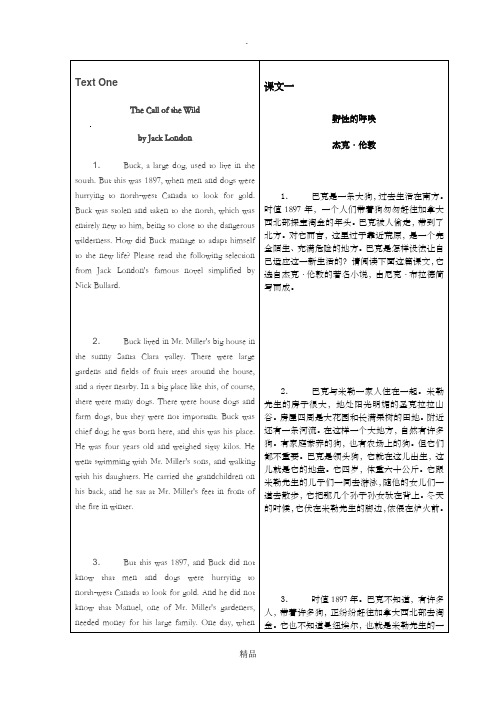
Text OneThe Call of the Wildby Jack London1.Buck, a large dog, used to live in the south. But this was 1897, when men and dogs were hurrying to north-west Canada to look for gold. Buck was stolen and taken to the north, which was entirely new to him, being so close to the dangerous wilderness. How did Buck manage to adapt himself to the new life? Please read the following selection from Jack London's famous novel simplified by Nick Bullard.2.Buck lived in Mr. Miller's big house in the sunny Santa Clara valley. There were large gardens and fields of fruit trees around the house, and a river nearby. In a big place like this, of course, there were many dogs. There were house dogs and farm dogs, but they were not important. Buck was chief dog; he was born here, and this was his place. He was four years old and weighed sixty kilos. He went swimming with Mr. Miller's sons, and walking with his daughters. He carried the grandchildren on his back, and he sat at Mr. Miller's feet in front of the fire in winter.3.But this was 1897, and Buck did not know that men and dogs were hurrying to north-west Canada to look for gold. And he did not know that Manuel, one of Mr. Miller's gardeners, needed money for his large family. One day, when 课文一野性的呼唤杰克·伦敦1.巴克是一条大狗,过去生活在南方。
B1 Unit 1 Text 2 英汉对照(原Unit1)

TEXT TWOA Wonderful Present1.Pete Richards was the loneliest man in town on the day that little Jean Grace opened the door of his shop.2.Pete's grandfather had owned the shop until his death. Then the shop became Pete's. The front window was full of beautiful old things: jewelry of a hundred years ago, gold and silver boxes, carved figures from China and Japan and other nations.3.On this winter afternoon, a child stood there, her face close to the window. With large and serious eyes, she studied each piece in the window. Then, looking pleased, she stepped back from the window and went into the shop.4.There was not much light inside the shop, but the little girl could see that the place was full of things; old guns and clocks, more jewelry and boxes and figures, and a hundred other things for which she didn't even know the names.5.Pete himself stood behind the counter. He was only 30 years old, but already his hair was turning gray. His eyes 课文二美好的礼物1.那天,小吉恩·格雷斯打开皮特·理查兹的店门时,皮特还是镇上最孤单的人。
B1 Unit 7 Text 1 英汉对照(原Unit9)
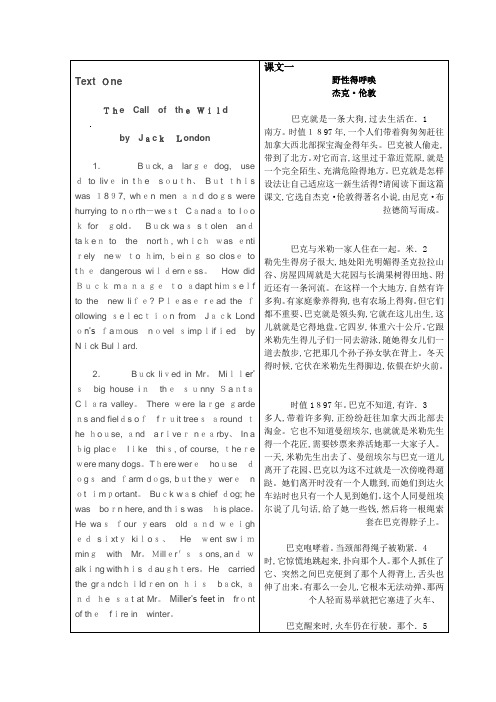
Text OneThe Call of theWildby JackLondon1.Buck, a largedog,use dto livein the south、But this was 1897, when men and dogs were hurrying to north-west Canadato loo kforgold。
Buck wasstolen andtakento the north, whichwas enti rely newto him, beingso closeto thedangerous wilderness。
How did Buckmanageto adapt himself to the new life? Pleaseread the following selection from Jack Lond on’s famous novel simplified by Nick Bullard.2.Buck lived in Mr。
Miller’sbig house inthesunny SantaClara valley。
There were large garde ns and fields offruit treesaround the house, and a rivernearby、In a big placelike this, of course, there were many dogs。
There werehousedogsand farm dogs, but theyweren ot important。
Buck was chief dog; he was born here, and this washis place。
He wasfour years old and weigh edsixtykilos、Hewent swimmingwith Mr。
B1 Unit 6 Text 2 英汉对照(原Unit2)

Text TwoSleepingUgly1.Princess Miserellawas a beautiful princessifyou co unted hereyes and nose andmouthand allthe waydown to her toes、But inside, whereit was hard to see,she was the meanest,wickedest, and most worthless princess around。
She liked stepping on dogs。
She kick edkittens、Shethrew pies in the cook'sface、And she never─no teven once─said thank you or please. Andbesides, she told lies、2.In thatvery samekingdom, in the middleof the woods, lived a poororphan named Plain Jane. She certainlywas、Her hairwasshort and turned down、He rnose was long andturned up、And even if they hadbeenthe other wayround, she would not h ave been a great beauty。
But she loved animals, and she wasalways kin dtostrangeold ladies.3.One day PrincessMiserellarodeout of the palace in a h uff。
(A huff is not a kind ofcar riage、It isa kind of temper tant rum。
B1Unit7Text1英汉对照(原Unit9)
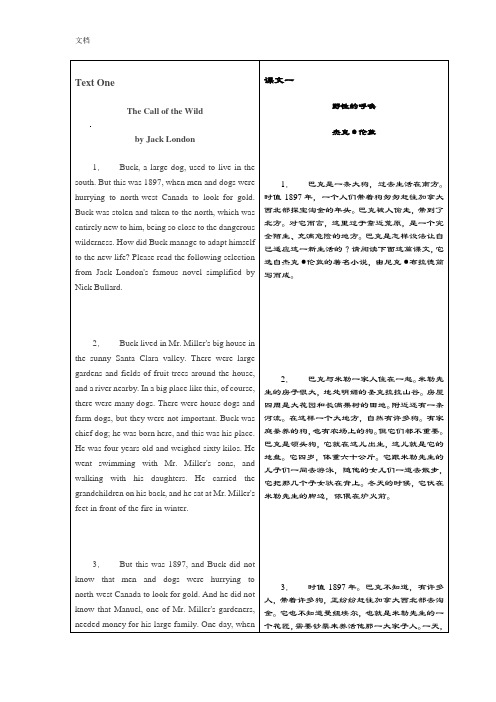
Text OneThe Call of the Wildby Jack London1.Buck, a large dog, used to live in the south. But this was 1897, when men and dogs were hurrying to north-west Canada to look for gold. Buck was stolen and taken to the north, which was entirely new to him, being so close to the dangerous wilderness. How did Buck manage to adapt himself to the new life? Please read the following selection from Jack London's famous novel simplified by Nick Bullard.2.Buck lived in Mr. Miller's big house in the sunny Santa Clara valley. There were large gardens and fields of fruit trees around the house, and a river nearby. In a big place like this, of course, there were many dogs. There were house dogs and farm dogs, but they were not important. Buck was chief dog; he was born here, and this was his place. He was four years old and weighed sixty kilos. He went swimming with Mr. Miller's sons, and walking with his daughters. He carried the grandchildren on his back, and he sat at Mr. Miller's feet in front of the fire in winter.3.But this was 1897, and Buck did not know that men and dogs were hurrying to north-west Canada to look for gold. And he did not know that Manuel, one of Mr. Miller's gardeners, needed money for his large family. One day, when 课文一野性的呼唤杰克·伦敦1.巴克是一条大狗,过去生活在南方。
B1 Unit 3 Text 1 英汉对照 (原unit6)
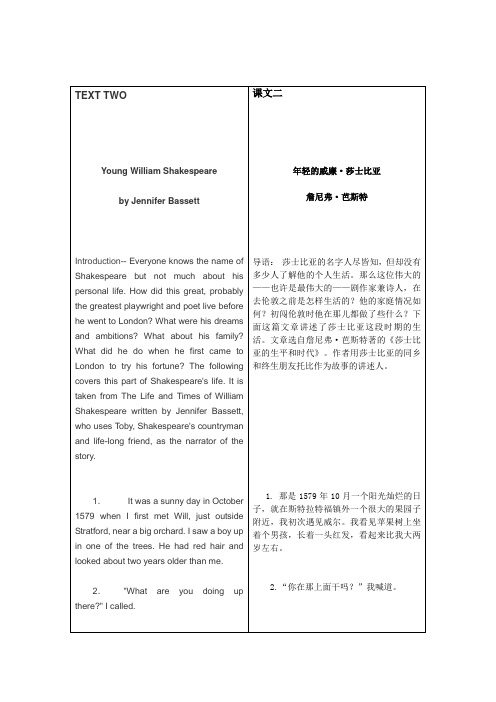
TEXT TWOYoung William Shakespeareby Jennifer BassettIntroduction-- Everyone knows the name of Shakespeare but not much about his personal life. How did this great, probably the greatest playwright and poet live before he went to London? What were his dreams and ambitions? What about his family? What did he do when he first came to London to try his fortune? The following covers this part of Shakespeare's life. It is taken from The Life and Times of William Shakespeare written by Jennifer Bassett, who uses Toby, Shakespeare's countryman and life-long friend, as the narrator of the story.1.It was a sunny day in October 1579 when I first met Will, just outside Stratford, near a big orchard. I saw a boy up in one of the trees. He had red hair and looked about two years older than me.2."What are you doing up there?" I called. 课文二年轻的威廉·莎士比亚詹尼弗·芭斯特导语:莎士比亚的名字人尽皆知,但却没有多少人了解他的个人生活。
人教新目标版英语九年级全单词表(英汉对照)

Words and Expressions in Each Unit(Book 9)Unit 1 How can we become good learners textbook /tekstbuk/ n. 教科书;课本p.1 conversation /kɔnvəs eɪʃn/, n. 交谈;谈话p.2 aloud /əlaud/ adv. 大声地;出声地p.2 pronunciation /prənʌnsieIʃn/ n. 发音;读音p.2 sentence /sentəns/ n. 句子p.2patient /peiʃnt/ adj. 有耐心的n. 病人p.2 expression /ikspreʃn/ n. 表达(方式);表示p.3 discover /dIskʌvə (r)/ v. 发现;发觉p.3secret /si:krət/ n. 秘密;adj. 秘密的;p.3fall in love with 爱上;与⋯⋯相爱p.3grammar /græmə (r)/ n. 语法p.3repeat /ripi:t/ v. 重复;重做p.4note /nəut/ n. 笔记;记录v. 注意;指出p.4pal /pæl/ n. 朋友;伙伴p.4pattern /pætn/, /pætən/ n. 模式;方式p.4 physics /fiziks/ n. 物理;物理学p.4chemistry /kemistri/ n. 化学p.4 partner /pa:(r)tnə (r)/ n. 搭档;同伴p.5pronounce /prənauns/ v. 发音p.5increase /Inkri:s/ v. 增加;增长p.5speed /spi:d/ n. 速度v.加速p.5ability /əbiləti/ n. 能力;才能p.6brain /brein/ n. 大脑p.6active /æktiv/ adj. 活跃的;积极的p.6attention /ətenʃn/ n. 注意;关注p.6pay attention to 注意;关注p.6connect /kənekt/ v.(使)连接;与⋯⋯有联connect …with 把⋯⋯和⋯⋯连接或联系起来overnight /əu və (r)nait/adv. 一夜之间;在夜间p.6review /rivju:/ v. & n. 回顾;复习knowledge /nɔlidʒ/, n. 知识;学问p.6wisely /waizli/ adv. 明智地;聪明地p.6Unit 2 I think that mooncakes are delicious!lantern /læntə (r)n/ n. 灯笼p.9stranger /streindʒə (r)/ n. 陌生人p.10relative /relətiv/ n. 亲属;亲戚p.10put on 增加(体重);发胖p.10pound /paund/ n. 磅(重量单位);英镑p.10folk /fəul k/ adj. 民间的;民俗的p.11goddess /gɔdes/, /gA:d@s/ n. 女神p.11steal /sti:l/ v. (stole /stəu l/, stolen /stəu lən/)偷;窃取p.11lay /lei/ v. (laid /leid/, laid)放置;安放;产(卵);下(蛋)p.11lay out 摆开;布置p.11dessert /di’zə:(r)t/ n(饭后)甜点;甜食p.11garden /ga:(r)dn/ n. 花园;园子p.11admire /ədmaiə (r)/ v. 欣赏;仰慕p.11tie /tai/ n. 领带v. 捆;束p.12haunted /hɔ:ntid/ a. 有鬼魂出没的;闹鬼的p.13ghost /gəu st/ n. 鬼;鬼魂p.13trick /trik/ n. 花招;把戏p.13treat /tri:t/ n. 款待;招待v. 招待;请客p.13spider /spaidər)/ n. 蜘蛛p.13Christmas /krisməs/n. 圣诞节p.14第 1 页共10 页fool /fu:l/ n. 蠢人;傻瓜v. 愚弄adj. 愚蠢的p.14 lie /laI/ v. (lay /leI/, lain /leIn/)平躺;处于 p.14novel /nɔvl/, /na:vl/ n.(长篇)小说p.14eve /i:v/ n(尤指宗教节假日的)前夕;前夜p.14 bookstore /bukstɔ:(r)/ n. 书店p.17dead /ded/ adj. 死的;失去生命的p.14business /biznəs/ n. 生意;商业p.14punish /pʌnis/ v. 处罚;惩罚p.14warn /wɔ:(r)n/ v. 警告;告诫p.14present /preznt/ n. 现在;礼物adj. 现在的p.14 nobody /nəu bədi/, /nəu ba:di/ pron. 没有人p.14 warmth /wɔ:(r)mθ/ n. 温暖;暖和p.14spread /spred/ v. 传播;展开n. 蔓延;传播 p.14 Macao /məkau/ 澳门 p.10Chiang Mai /tʃiæn maI/, /dʒa:nmaI/ 清迈(泰城市)Halloween /hæləu i:n/ 万圣节前夕p.13St. /seint/ Valentine’s /væləntainz/ Day 情人节Unit 3 Could you please tell me where the restrooms are? restroom /restru:m/ n.(美)洗手间;公共厕所p.17stamp /stæmp/ n. 邮票;印章p.17postcard /pəu stka:(r)d/ n. 明信p.18pardon /pa:(r)dn/ interj.请再说一遍;p.18washroom /wɔʃru:m/, n. 洗手间;厕所p.18bathroom /ba:θru:m/ n. 浴室;洗手间p.18quick /kwik/adj. 快的;迅速的p.18rush /rʌʃ/ v. & n. 仓促;急促p.18suggest /sədʒest/ v. 建议;提议p.19staff /sta:f/ n. 管理人员;职工p.19grape /greip/ n. 葡萄p.20central /sentrəl/ adj. 中心的;中央的p.20mail /meil/ v. 邮寄;发电子邮件n. 邮件p.20east /i:st/ adj. 东方的adv. 向东;n.东方p.20fascinating /fæsineitiŋ/ a.迷人的;有吸引力的p.21convenient /kənvi:niənt/ a.便利的;方便的p.21mall /mɔ:l/ n. 商场;购物中心p.21clerk /kla:k/, /kl3:rk/ n. 职员p.21corner /kɔ:(r)nə(r)/ n. 拐角;角落p.21polite /pəlait/ adj. 有礼貌的;客气的p.22politely /pəlaitli/ adv. 礼貌地;客气地p.22speaker /spi:kə(r)/ n.讲(某种语言)的人;发言者request /rikwest/ n. 要求;请求p.22choice /tʃɔi s/ n. 选择;挑选p.22direction /direkʃn, dairekʃn/ n. 方向;方位p.22correct /kərekt/ adj. 正确的;恰当的p.22direct /direkt, dairekt/ adj. 直接的;直率的p.22whom /hu:m/ pron. 谁;什么人p.22address /ədres/, /ædres/ n. 地址;通讯处p.22faithfully /feiθfəli/ adv. 忠实地;忠诚地p.24Italian /Itæliən/ a. 意大利\人的;n. 意大利人\语Unit 4 I used to be afraid of the dark.humorou /hju:mərəs/ a.有幽默感的;滑稽的p.26silent /sailənt/ adj. 不说话的;沉默的p.26helpful /helpfl/adj. 有用的;有帮助的p.26from time to time 时常;有时p.26score /skɔ:(r)/ n. & v. 得分;打分p.26background /bækgraund/ n. 背景p.27第 2 页共10 页interview /Intə (r)vju:/ v. 采访;面试n.访谈p.27 Asian /eiʃn, / a. 亚洲/人的;n. 亚洲人p.27 deal with 对付; 应付p.27dare /deə/, /der/ v. 敢于;胆敢p.27private /praivət/ adj. 私人的;私密的p.27 guard /ga:(r)d/ n. 警卫;看守v. 守卫;保卫p.27 require /rikwaiə(r)/ v. 需要;要求p.27 European /ju(ə)rəpi:ən/ a. 欧洲\人的p.28British /britiʃ/ adj. 英国的;英国人的p.28 speech/spi:tʃ/ n. 讲话;发言p.28ant /ænt/ n. 蚂蚁p.29insect /insekt/ n. 昆虫p.29influence /influəns/ v. & n. 影响p.30seldom /seldəm/ adv. 不常;很少p.30proud /praud/ adj. 自豪的;骄傲的p.30be proud of 为⋯⋯骄傲;感到自豪p.30absent /æbsənt/ adj. 缺席;不在p.30fail /feil/ v. 失败;未能(做到)p.30 examination /igzæmineiʃn/ n. 考试;审查p.30 boarding /bɔ:(r)diŋ/ school 寄宿学校p.30in person 亲身;亲自p.30exactly /igzæktli/ adv. 确切地;精确地p.30pride /praid/ n. 自豪;骄傲p.30take pride in 为⋯⋯感到自豪p.30grandson /grænsʌn/ n. 孙子;外孙p.31general /dʒenrəl/ a. 普遍的;常规的;总的n. 将军p.32introduction /intrədʌkʃn/ n. 介绍p.32Unit 5 What are the shirts makde of?material /mətiəriəl/ n. 材料;原料p.33chopsticks /tʃɔpstiks/n. 筷子p.33coin /kɔin/n.硬币p.33fork /fɔ:k/n.餐叉,叉子p.33blouse /blauz/ n.(女士)短上衣;衬衫p.33sliver /silvə/ n. 银,银器;adj.银色的p.33glass /glas/ n.玻璃p.33cotton /kɔtn/ n.棉;棉花p.33steel /sti:l/ n. 钢;钢铁p.33grass /gras/ n. 草;草地P.34leaf /li:f/ n(pl. leaves /li:vz/)n. 叶,叶子produce /prədju:s/,v. 生产;制造;出产p.34widely /waidli/ adv. 广泛地;普遍地 p.34process /prəu ses/, v. 加工;处理p.34France /fra:ns/, /fr{ns/ 法国p.35no matter 不论;无论p.35local /ləu kl/ adj. 当地的;本地的p.35even though 虽然;即使p.35brand /brænd/ n. 品牌;牌子p.35avoid /əvɔi d/ v. 避免;回避p.35product /prɔdʌkt/ n.产品;制品p.35handbag /hændbæg/ n. 小手提包p.35mobile /məu bail/, /məu bl/ a.可移的;非固定的Germany /dʒə:(r)məni/ n. 德国p.36surface /sə:(r)fis/ n. 表面;表层p.36postman /pəu stmən/ n. 邮递员p.36cap /kæp/ n(.尤指有帽舌的)帽子p.36glove /glʌv/ n(分手指的)手套 p.36第 3 页共10 页international /intə(r)næʃnəl/ adj. 国际的p.37 competitor /kəmpetitə(r)/ n.参赛者;竞争者p.37 paint /peint/ v. 用颜料画;刷漆p.37its /its/ adj. 它的p.38form /fɔ:(r)m/ n. 形式;类型p.38clay /klei/ n. 黏土;陶土p.38balloon /bəlu:n/ n. 气球p.38scissors /sizə(r)z/ n. (pl.) 剪刀p.38lively /laivli/ a. 生气勃勃的;(色彩)鲜艳的p.38 fairy /feəri/, /feri/ tale /teil/ n.童话故事p.38 heat /hi:t/ n. 热;高温p.38 polish /pɔliʃ/ v. 磨光;修改;润色p.38 complete /kəmpli:t/ v. 完成p.38 Korea /kəri:ə/ 朝鲜;韩国p.33Switzerland /switsə(r)lənd/ 瑞士p.35San Francisco /sæn frənsiskəu/圣弗朗西斯科(旧金山,美国城市)p.35 Pam /pæm/ 帕姆(女名)p.34 Unit 6 When was it invented? heel /hi:l/ n. 鞋跟;足跟p.42electricity /ilektrisəti/ n. 电;电能p.42scoop /sku:p/ n.勺; 铲子p.42style/stail/ n. 样式; 款式p.42project /prədʒekt/ n. 项目;工程p.42pleasure /pleʒə(r)/ n. 高兴;愉快p.42zipper /zipə(r)/ n. (= zip) 拉链;拉锁p.42daily /deili/ adj. 每日的;日常的p.42website /websait/ n. 网站p.42pioneer /paiəniə/ n.先锋;先驱p.42list /list/ v. 列表;列清单n. 名单;清单p.42mention /menʃn/ v. 提到;说到p.42by accident 偶然;意外地p.43nearly /niəli/, /nirli/ adv. 几乎;差不多 p.43boil /bɔi l/ v. 煮沸;烧开p.43smell /smel/ n. 气味v. 发出气味;闻到p.43saint/seint/ n. 圣人;圣徒p.43take place 发生;出现p.43doubt /daut/ n. 疑惑;疑问v. 怀疑p.43without doubt 毫无疑问;的确p.43fridge /fridʒ/ n. 冰箱p.44translate /trænsleit/ v. 翻译p.44lock /lɔk/, /la:k/ v. 锁上;锁住p.44earthquake /ə:(r)θkweik/n. 地震p.44sudden /sʌdən/ adj. 突然(的)p.44all of a sudden 突然; 猛地p.44biscuit /biskit/ n. 饼干p.44cookie/kuki/ n. 曲奇饼干p.44instrument /instrumənt/n. 器械;仪器;工具p.44crispy /krispi/ adj. 脆的;酥脆的p.45sour /sauə(r)/ adj. 酸的;有酸味的p.45by mistake 错误地;无意中p.45customer /kʌstəmə (r)/ n. 顾客;客户p.45Canadian /kəneidiən/ a. /n.加拿大/人的p.46divide /divaid/ v. 分开;分散p.46divide ... into 把⋯⋯分开p.46purpose /pə:(r)pəs/ n. 目的;目标p.46第 4 页共10 页basket /ba:skit/ n. 篮;筐p.46the Olympics /əu limpiks/ 奥林匹克运动会p.46look up to 钦佩;仰慕p.46hero /hiərəu/ n. 英雄;男主角p.46Berlin /bə:lin/ 柏林(德国城市)p.46NBA (National Basketball Association)国家篮球协会(美国职业篮球联赛)p.46CBA (China Basketball Association)中国篮球协会(中国职业篮球联赛)p.46Unit 7 Teenagers should be allowed to choose their own clothes.smoke /sməu k/ v. 冒烟;吸烟n. 烟p.49pierce /piəs/, /pirs/ v. 扎;刺破;穿透p.49 license /laIsns/n. (= licence) 证;证件p.49safety /seifti/ n. 安全;安全性p.49earring /iəriŋ/ n. 耳环;耳饰p.50cry /krai/ v. & n. 哭;叫喊p.51field /fi:ld/ n. 田野;场地p.51hug /hʌg/ n. & v. 拥抱;搂抱p.51 lift /lIft/ v. 举起;抬高p.51talk back 回嘴;顶嘴p.51awful /ɔ:fl/ adj. 很坏的;讨厌的p.51teen /ti:n/ n. 十几岁(十三至十九岁之间)regret /rigret/ v. 感到遗憾;懊悔p.51poem /pəui m/ n. 诗;韵文p.51bedroom /bedru:m/ n. 卧室p.52community /kəmju:nəti/ n. 社区;社团p.52keep away from 避免接近;远离p.52chance /tʃa:ns/ n. 机会;可能性p.52make one’s own decision 自己做决定p.52manage /mænidʒ/ v. 设法做到;应付(困难局面)society /səsaiəti/ n. 社会p.52unit /ju:nit/ n. 单位;单元p.52educate /edʒukeit/ v. 教育;教导p.52get in the way of 挡……的路;妨碍p.54professional /prəfeʃənl/ a.职业的;专业的p.54enter /entə(r)/ v. 进来;进去p.54support /səpɔ:(r)t/ v. & n. 支持p.54Unit 8 It must belong to Carla.truck /trʌk/ n. 卡车;货车p.57rabbit /ræbIt/ n. 兔;野兔p.57whose /hu:z/ adj. & pron. 谁的;(特)那个人的attend /ətend/ v. 出席;参加p.58valuable /væljuəbl/ a. 很有用的;宝贵的p.58pink /pink/ adj. 粉红色的n. 粉红色p.58picnic /piknik/ n. 野餐p.58somebody /sʌmbədi/ pron. 某人;重要人物p.58anybody /enibədi/ pron. 任何人p.58noise /nɔi z/ n. 声音;噪音p.59policeman /pəli:smən/ n. 男警察p.59wolf /wulf/ n. 狼p.59laboratory /ləbɔrətri/ n. 实验室p.60coat /kəu t/ n. 外套;外衣p.60sleepy /sli:pi/ adj. 困倦的;瞌睡的p.60pocket /pɔkit/ n. 衣袋;口袋p.60alien /eiliən/ n. 外星人p.61suit /sju:t/, /su:t/ n. 西服;套装p.61第 5 页共10 页express /ikspres/ v. 表示;表达p.62not only … but also 不但……,而且p.62circle /sə:(r)kl/ n. 圆圈v. 圈出p.62Britain /britn/ n. (= Great Britain) 大不列颠p.62 receive /risi:v/ v. 接受;收到p.62leader /li:də (r)/ n. 领导;领袖p.62 midsummer /mIidsmə(r)/ n.仲夏;中夏p.62 medical /medikl/ adj. 医疗的;医学的p.62 prevent /privent/ v. 阻止;阻挠p.62energy /enə(r)dʒi/ n. 精力;力量p.62position /pəziʃn/ n. 位置;地方p.62burial /beriəl/ n. 埋葬;安葬p.62honor /ɔnə/v. (= honour) 尊重;表示敬意n. 荣幸ancestor /ænsestə(r)/ n. 祖宗;祖先p.62victory /viktəri/ n. 胜利;成功p.62enemy /enəmi/ n. 敌人;仇人p.62period /piəriəd/ n. 一段时间;时期p.62 mystery /mistri/ n. 奥秘;神秘事物p.64 Stonehenge /stəu nhendʒ/ 巨石阵p.62 Unit 9 I like music that I can dance to.prefer /prifə:(r)/ v. 更喜欢p.65Lyrics /liriks/ n. (pl.) 歌词p.65Australian /ɔstreiliən/ a.澳大利亚/人的n. 澳大利亚人p.66electronic /ilektrɔnik/ a. 电子(设备)的p.66suppose /səp推断;料想p.66平滑的;悦耳的p.66spare /speə / adj. 空闲的;不用的p.66case /keIs/ n. 情况;实情p.66in that case 既然那样;假使那样的话p.66war /wɔ:(r)/ n. 战争;战争状态p.66director /direktə/ n.导演;部门负责人p.66dialogue /daiəlɔg / n. (=dialog) 对话;对白p.67documentary /dɔkjumentri/n. 纪录片p.67drama /dra:mə/ n. 戏;剧p.67plenty /plenti/ pron. 大量;众多p.67plenty of 大量;充足p.67shut /ʃʌt/ v. (shut, shut) 关闭;关上p.67superhero /su:pə(r)hiərəu/ n.超级英雄p.67horror /hɔrə/ n. 震惊;恐惧p.67thriller /θr il@(r)/ n.惊险电影(小说、戏剧p.67intelligent /intelIdʒənt/ a.有才智的;聪明的p.68sense /sens/ v. 感觉到;意识到n. 感觉;意识 p.70pain /pein/ n. 痛苦;苦恼p.70reflect /riflekt/ v. 反映;映出p.70perform /pə (r)fɔ:(r)m/ v. 表演;执行p.70amazing /əmeiziŋ/ a. 令人惊奇/喜的p.70pity /piti/ n. 遗憾;怜悯p.70total /təu tl/ n. 总数;合计a. 总的;全体的p.70in total 总共;合计p.70master /ma:stə / n. 能手;主人v. 掌握p.70praise /preiz/ v. & n. 表扬;赞扬p.70national /næʃnl/ adj. 国家的;民族的p.70recall /rikɔ:l/ v. 回忆起;回想起p.70wound /wu:nd/ n. 伤;伤口;创伤p.70World War II 二战p.66Titanic /taitænik/ 《泰坦尼克号》(电影名)p.67第 6 页共10 页Unit 10 You're supposed to shake hands.custom /kʌstəm/ n. 风俗;习俗p.73bow /bau v. 鞠躬p.73kiss /kis/ v. & n. 亲吻;接吻p.73greet /gri:t/ v. 和⋯⋯打招呼;迎接p.74 value /vælju:/ v. 重视;珍视n. 价值p.75 everyday /evridei/ adj. 每天的;日常的p.75 drop by 顺便访问;随便进入p.75capital /kæpitl/ n. 首都;国都p.75noon /nu:n/ n. 正午;中午p.75mad /mæd/ adj. 很生气;疯的p.75get mad 大动肝火;气愤p.75make an effort 作出努力p.75traffic /træfik/ n. 交通;路上行驶的车辆p.75 somewhere /sʌmweə / adv. 在某处;到某处p.75 passport /pa:spɔ:t / n. 护照p.76 chalk /tʃɔ:k/ n. 粉笔p.76blackboard /blækbɔ:(r)d/ n. 黑板p.76northern /nɔ:(r)ð(r)n/ adj. 北方的;北部的p.76 coast /kəu st/ n. 海岸;海滨p.76season /si:zn/ n. 季;季节p.76knock /nɔk/ v. 敲;击p.76eastern /i:stə (r)n/ adj. 东方的;东部的p.76worth /wə:(r)θ/ adj. 值得;有价值(的)p.76manner /mænə(r)/ n. 方式;方法(pl.) 礼貌;礼仪empty /empti/ adj. 空的;空洞的p.77basic /beisik/ adj. 基本的;基础的p.78exchange /ikstʃeindʒ/ n. & v. 交换p.78go out of one’s way特地;格外努力p.78make ... feel at home 使(某人)感到宾至如归granddaughter /grændɔ:tə(r)/ n. (外)孙女p.78behave /biheiv/ v. 表现;举止p.78except /iksept/ prep. 除……之外conj. 除了;只是elbow /elbəu/ n. 肘;胳膊p.78gradually /grædʒuəli/ adv. 逐步地;渐进地p.78suggestion /sədʒestʃən/ n. 建议p.80Brazil /brəzil/ 巴西p.73Mexico /meksikəu/ 墨西哥p.73Cali /ka:li/ 卡利(哥伦比亚城市)p.75Colombia /kəlʌmbiə/ 哥伦比亚(南美洲国家)Lausanne /ləu zæn/ 洛桑(瑞士城市)p.75Norway /nɔ:(r)wei 挪威p.76Unit 11 Sad movies make me cry.the more … the more… 越……越……p.82leave out 不包括;不提及;忽略p.82friendship /frendʃi p/ n. 友谊;友情p.82king /kiŋ/ n. 君主;国王p.83prime /praim/ adj. 首要的;基本的p.83minister /ministə(r)/ n. 大臣;部长p.83prime minister 首相;大臣p.83fame /feim/ n. 名声;声誉p.83pale /peil/ adj. 苍白的;灰白的p.83queen /kwi:n/ n. 王后;女王p.83examine /igzæmin/ v(.仔细地)检查;检验p.83nor /nɔ:(r)/ conj. & adv. 也不p.83neither ... nor 既不⋯⋯也不p.83palace /pæləs/ n. 王宫;宫殿p.83第7 页共10 页power /pauə(r)/ n. 权利;力量p.83wealth /welθ/ n. 财富;富裕p.83grey /grei/ a.阴沉的;昏暗的;灰色的p.84lemon /lemən/ n. 柠檬p.84cancel /kænsl/ v. 取消;终止p.84weight /weit/ n. 重量;分量p.86shoulder /ʃəuldə(r)/ n. 肩;肩膀p.86goal /gəul/ n. 球门;射门;目标p.86coach /kəutʃ / n. 教练;私人教师p.86kick /kik/ v. 踢;踹p.86 teammate /ti:meit/ n. 同队队员;队友p.86 courage /kʌridʒ / n. 勇敢;勇气p.86rather /ra:ð/ə/ adv. 宁愿;相当p.86rather than 而不是p.86pull /pul/ v. 拉;拖p.86pull together 齐心协力;通力合作p.86relief /rili:f/ n. 轻松;解脱p.86nod /nɔd/ v. 点头p.86agreement /əgri:mənt/ n. (意见或看法)一致;同意p.86fault /fɔ:lt/ n. 过失;缺点p.86disappoint /disəpɔi nt/ v. 使失望p.87Bert /bə:(r)t/ 伯特(男名)p.82Holly /hɔli / 霍莉(女名)p.84Unit 12 Life is full of the unexpected.backpack /bækpæk/ n. 背包;旅行包 p.89oversleep v.(overslept , overslept) 睡过头 p.89give ... a lift 捎(某人)一程p.90miss /mis/ v. 错过;未得到 p.91unexpected /ʌnikspektid/ a.出乎意料的;始料不及的block /blɔk / n. 街区p.91worker /wə:(r)kə(r)/ n. 工作者;工人p.91stare /steə/ v. 盯着看;凝视p.91disbelief /disbili:f/ n. 不信;怀疑p.91above /əbʌv/ adv. 在上面;向上面prep. 在上面 p.91burn /bə:(r)n/ v. (burnt /bə:(r)nt/, burned /;burnt,burned) 着火;燃烧p.91alive /əlaIv/adj. 活着;有生气的p.91take off(飞机等)起飞;匆忙离开p.91till /til/ conj. & prep. 到;直到p.91west /west/ adv. 向西;朝西adj. 向西的;西部的n.西;西方p.91cream /kri:m/ n. 奶油;乳脂p.92boss/bɔs/ n. 老板;领导p.92pie /pai/ n. 果馅饼;果馅派p.92course /kɔ:(r)s/ n. 课程p.92bean /bi:n/ n. 豆;豆荚p.92market /ma:(r)kit/ n. 市场;集市p.92costume /kɔstju:m/ n.服装;装束p.93embarrassed /imbærəst/ adj.窘迫的;害羞的p.93announce /ənauns/ v. 宣布;宣告p.94spaghetti /spəgeti/ n. 意大利面条p.94hoax /həu ks/ n. 骗局;恶作剧p.94discovery /diskʌvəri/ n. 发现;发觉p.94lady /leidi/ n. 女士;女子p.94第8 页共10 页officer /ɔfisə/ n.军官;官员p.94believable /bili:vəbl/ adj.可相信的;可信任的p.95 embarrassing /imbærəsiŋ/ a. 使人害羞的(难堪的或惭愧的)p.95New Zealand /nju:zi:lənd/ 新西兰p.91Italy /Itəli/ 意大利p.94Mars /ma:(r)z/ 火星p.94Unit 13 We're trying to save the earth!litter /litə(r)/ v. 乱扔n. 垃圾;废弃物p.97 bottom /bɔtəm/n. 底部;最下部p.97 fisherman /fiʃə(r)mən/ n. 渔民;钓鱼的人p.97coal /kəu l/ n. 煤;煤块p.98public /pʌblik/ adj. 公众的;公共的n. 民众;百姓p.98ugly /ʌgli/ adj. 丑陋的;难看的p.98 advantage /ədva:ntidʒ/ n. 优点;有利条件p.98 cost /kɔst/, /kɔ:st/ v. 花费n. 花费;价钱p.98 wooden /wudn/ adj. 木制的;木头的p.98plastic /plæstik/ adj. 塑料的n. 塑料;塑胶p.98 make a difference 有关系,作用,影响p.98shark /ʃa:(r)k/ n. 鲨鱼p.99fin /fin/ n(.鱼)鳍p.99cut off 割掉;砍掉p.99method /meθəd/ n. 方法;措施p.99cruel /kru:əl/ adj. 残酷的;残忍的p.99harmful /ha:(r)mfl/ adj. 有害的p.99chain /tʃein/ n. 链子;链条p.99ecosystem /i:kəu sistəm/ n. 生态系统p.99low /ləu/ a(.数量等)减少的;低的;矮的p.99industry /indəstri/ n. 工业;行业p.99law /lɔ:/ n. 法律;法规p.99reusable /ri:ju:zəbl/ adj.可重复使用的;可再次使用的p.100afford /əfɔ:(r)d/ v. 承担得起(后果);买得起transportation /tænspɔ:(r)teiʃn/n. 运输业;交通运输p.100recycle /ri:saikl/ v. 回收利用;再利用p.101napkin /næpkin/ n. 餐巾;餐巾纸p.101upside down 颠倒;倒转p.102gate /geIt/ n. 大门p.102bottle /bɔtl/ n. 瓶;瓶子p.102president /prezidənt/ n. 负责人;主席;总统p.102inspiration /inspəreiʃn/ n. 灵感;鼓舞人心的人(或事物)p.102metal /metl/ n. 金属p.102creativity /kri:eitivəti/ n. 创造力;独创性WildAid /waildeid/ 野生救援协会(美国)p.99WWF (World Wide Fund For Nature)世界自然基金会p.99Unit 14 I remember meeting all of you in Grade 7survey /sə:(r)vei/ n. 调查p.105standard /stændə(r)d/ n. 标准;水平p.105row /rəu/ n. 一排;一列;一行p.105in a row 连续几次地p.105keyboard /ki:bɔ:(r)d/ n. 琴键;键盘p.105instruction /instrʌkʃn/ n. 指示;命令p.106第9 页共10 页double /dʌbl/ v. 加倍;是⋯⋯的两倍adj. 两倍的;加倍的p.106shall /ʃæl/ modal v. 将要;将会p.106overcome /əu və(r)kʌm/ v.(overcame , overcome) 克服;战胜p.107make a mess 弄得一团糟,一塌糊涂p.107 graduate /grædʒueit/ v. 毕业;获得学位p.107keep one’s cool 沉住气;保持冷静p.107ours /auə(r)z/ pron. 我们的p.107senior /si:niə(r)/ a. 级别(或地位)高的p.108 senior high (school) 高中p.108text /tekst/ n. 课文;文本p.108level /levl/ n. 标准;水平p.108degree /digri:/ n(.大学)学位;度数;程度p.109manager /mænidʒə(r)/ n. 经理;经营者p.109 believe in 信任;信赖p.109gentleman /dʒentlmən/ n. 先生p.110graduation /grædʒueiʃn/ n. 毕业p.110 ceremony /serəməni/ n. 典礼;仪式p.110 congratulate /kəngrætʃuleit/ v. 祝贺p.110 thirsty /θ3:(r)sti/ a. 口渴的;渴望的p.110 none /nʌn/ pron. 没有一个;毫无p.110task /ta:sk / n. 任务;工作p.110ahead /əhed/ adv. 向前面;在前面p.110 responsible /rispɔnsəbl/ adj. 有责任的p.110 be responsible for 对……负责任p.110 separate /sepəreit/ adj. 单独的;分离的v. 分开;分离p.110wing /wiŋ/ n. 翅膀;翼p.111第10 页共10 页。
大学英语通识教程第二册 Unit 7 参考译文
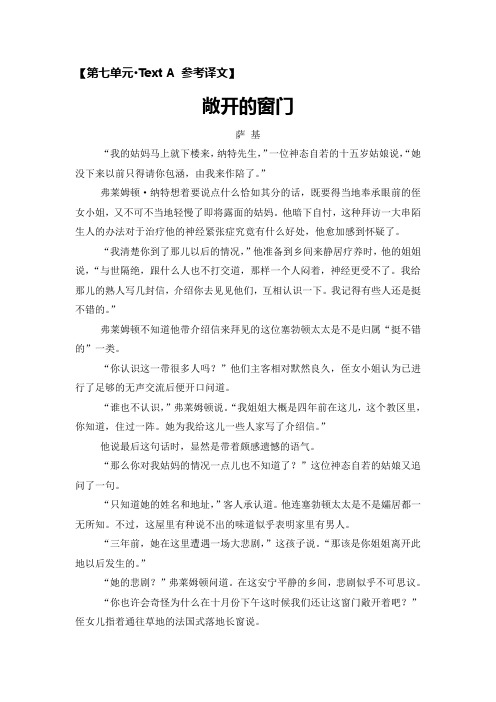
【第七单元·Text A 参考译文】敞开的窗门萨基“我的姑妈马上就下楼来,纳特先生,”一位神态自若的十五岁姑娘说,“她没下来以前只得请你包涵,由我来作陪了。
”弗莱姆顿·纳特想着要说点什么恰如其分的话,既要得当地奉承眼前的侄女小姐,又不可不当地轻慢了即将露面的姑妈。
他暗下自忖,这种拜访一大串陌生人的办法对于治疗他的神经紧张症究竟有什么好处,他愈加感到怀疑了。
“我清楚你到了那儿以后的情况,”他准备到乡间来静居疗养时,他的姐姐说,“与世隔绝,跟什么人也不打交道,那样一个人闷着,神经更受不了。
我给那儿的熟人写几封信,介绍你去见见他们,互相认识一下。
我记得有些人还是挺不错的。
”弗莱姆顿不知道他带介绍信来拜见的这位塞勃顿太太是不是归属“挺不错的”一类。
“你认识这一带很多人吗?”他们主客相对默然良久,侄女小姐认为已进行了足够的无声交流后便开口问道。
“谁也不认识,”弗莱姆顿说。
“我姐姐大概是四年前在这儿,这个教区里,你知道,住过一阵。
她为我给这儿一些人家写了介绍信。
”他说最后这句话时,显然是带着颇感遗憾的语气。
“那么你对我姑妈的情况一点儿也不知道了?”这位神态自若的姑娘又追问了一句。
“只知道她的姓名和地址,”客人承认道。
他连塞勃顿太太是不是孀居都一无所知。
不过,这屋里有种说不出的味道似乎表明家里有男人。
“三年前,她在这里遭遇一场大悲剧,”这孩子说。
“那该是你姐姐离开此地以后发生的。
”“她的悲剧?”弗莱姆顿问道。
在这安宁平静的乡间,悲剧似乎不可思议。
“你也许会奇怪为什么在十月份下午这时候我们还让这窗门敞开着吧?”侄女儿指着通往草地的法国式落地长窗说。
“就这季节来说,天气还很暖和,”弗莱姆顿说,“不过这窗跟那悲剧有什么关系吗?”“三年前的今天,她丈夫和她两个年轻兄弟穿过这扇门窗出去打猎,从此再也没有回来。
经过沼泽地到他们喜欢射猎松鸡的地方时,他们三个人都陷进了危险的泥沼里。
那年夏天,特别潮湿多雨,你知道,平常年份安全的地方突然就塌陷了。
B1 Unit 7 Text 1 英汉对照(原Unit9)
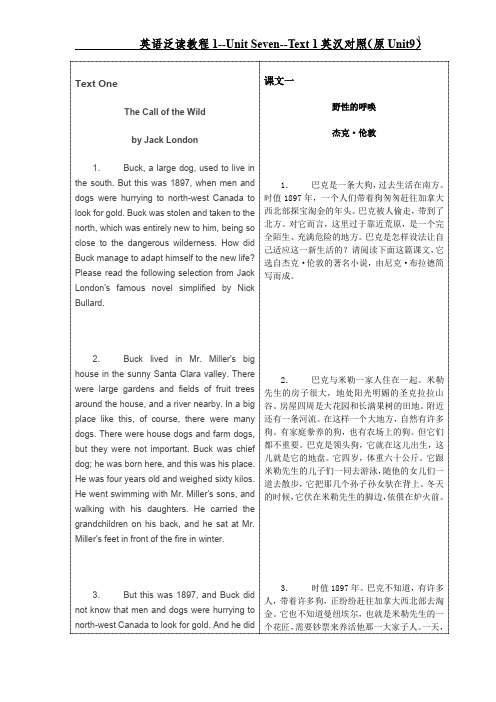
Text OneThe Call of the Wildby Jack London1.Buck, a large dog, used to live in the south. But this was 1897, when men and dogs were hurrying to north-west Canada to look for gold. Buck was stolen and taken to the north, which was entirely new to him, being so close to the dangerous wilderness. How did Buck manage to adapt himself to the new life? Please read the following selection from Jack London's famous novel simplified by Nick Bullard.2.Buck lived in Mr. Miller's big house in the sunny Santa Clara valley. There were large gardens and fields of fruit trees around the house, and a river nearby. In a big place like this, of course, there were many dogs. There were house dogs and farm dogs, but they were not important. Buck was chief dog; he was born here, and this was his place. He was four years old and weighed sixty kilos. He went swimming with Mr. Miller's sons, and walking with his daughters. He carried the grandchildren on his back, and he sat at Mr. Miller's feet in front of the fire in winter.3.But this was 1897, and Buck did not know that men and dogs were hurrying to north-west Canada to look for gold. And he did 课文一野性的呼唤杰克·伦敦1.巴克是一条大狗,过去生活在南方。
B1 Unit 3 Text 2 英汉对照资料讲解

B1U n i t3T e x t2英汉对照Text OneThe Best Playwright in Englandby Jennifer Bassett1. The plague came and in September 1592 the City Council closed the theatres in London. They didn't open again until June 1594.2. After the plague years, we were busy all the time. There were new companies of players and Will now belonged to the Lord Chamberlain's Men. The Lord Chamberlain was a very important man, close to the Queen, and we often put on plays for the Queen's court, and in the houses of the great lords of England. We had some very good actors. There was Will, and Richard Burbage, of course, and John Heminges. And there was Augustine Phillips, Henry Condell, and Thomas Pope. There were other actors, too, but those six were the real company. They worked together for more than twenty years.3. Will was special—because he wrote the plays. And what plays they were! He never wrote the same play twice, like some writers. He was always trying something new, something different. And he wrote fast, too.4. John Heminges could never understand that. "How can you write so fast, Will?" he asked Will. "And you never make a mistake or change a word."5. Will didn't really understand it 课文一英国最好的剧作家詹尼弗·芭斯特1.黑死病爆发后,市议会于1592年9月关闭了伦敦的剧场。
- 1、下载文档前请自行甄别文档内容的完整性,平台不提供额外的编辑、内容补充、找答案等附加服务。
- 2、"仅部分预览"的文档,不可在线预览部分如存在完整性等问题,可反馈申请退款(可完整预览的文档不适用该条件!)。
- 3、如文档侵犯您的权益,请联系客服反馈,我们会尽快为您处理(人工客服工作时间:9:00-18:30)。
Text TwoThe Call of the Wildby Jack London1. The wild animal was strong in Buck, and as he traveled across the snow, it grew stronger and stronger. And as Buck grew stronger, he hated Spitz more and more, although he was careful never to start a fight.2. But Spitz was always showing his teeth to Buck. And Buck knew that if he and Spitz fought, one of them would die.3. The fight almost happened one night when they stopped by a lake. There was heavy snow and it was very cold. The lake was frozen and Franois, Perrault, and the dogs had to spend the night on the ice, under a big rock. Buck had made a warm hole in the snow and was sorry to leave it to get his piece of fish. But when he had eaten, and returned to his hole, he found Spitz in it. Buck had tried not to fight Spitz before, but this was too much. He attacked him angrily. Spitz was surprised. He knew Buck was big, but he didn't know he was so wild. Franois was surprised too, and guessed why Buck was angry. 课文二野性的呼唤杰克·伦敦1.巴克的内心有着强烈的野性。
在它穿越茫茫雪原的同时,这种野性也与日俱增。
另外,随着体魄的日益强健,巴克越来越憎恶斯皮兹。
不过,它总是小心谨慎,尽量不挑起事端。
2.然而,斯皮兹总在寻衅滋事。
巴克知道,如果它与斯皮兹打起来,两者必有一死。
3.一天夜晚,这场搏斗差一点儿就发生了。
当时,他们是在一个湖边歇脚。
正下着大雪,天气非常寒冷。
湖面结了冰。
弗朗索瓦、佩罗特和几条狗不得不躲在冰面上一块大岩石底下过夜。
巴克在雪地里挖好了一个温暖的窝,然后恋恋不舍地离开,好去领自己那条鱼。
它吃完鱼,再回到自己的窝时,却发现斯皮兹呆在里头。
此前,巴克一直尽力不与斯皮兹发生冲突。
但现在这事儿实在太过分了。
它怒气冲冲地扑向斯皮兹。
斯皮兹大吃一惊。
它早知道巴克体格魁梧,但没想到巴克有这么凶猛。
弗朗索瓦也颇感意外,但他猜到了巴克为什么如此怒不可遏。
4. "Go on, Buck!" he shouted. "Fight him, the dirty thief!"5. Spitz was also ready to fight, and the two dogs circled one another, looking for the chance to jump in. But suddenly there was a shout from Perrault, and they saw eighty or a hundred dogs around the sledge. The dogs came from an Indian village, and they were searching for the food that they could smell on the sledge. Perrault and Franois tried to fight them off with their clubs but the dogs, made crazy by the smell of the food, showed their teeth and fought back.6. Buck had never seen dogs like these. They were all skin and bone, but hunger made them fight like wild things. Three of them attacked Buck and in seconds his head and legs were badly bitten. Despite this, Buck fought bravely. He caught a dog by the neck and tasted blood. He threw himself on the next one, and then felt teeth in his own neck. It was Spitz, attacking him from the side.7. Perrault and Franois came to help with clubs, but then they had to run back to save the food. It was safer for the4.“冲上去,巴克!”他叫喊道:“去揍它,这个可耻的小偷!”5.斯皮兹也摆好架势,要打上一架。
两条狗对峙着,一边兜着圈子,一边寻找扑上去的机会。
突然间,他们听到佩罗特的叫喊,只见上百条狗包围了雪橇。
这些狗来自一座印地安人的村庄。
它们闻到雪橇上有食物,正围在那里,搜个不停。
弗朗索瓦与佩罗特试图用棍棒将它们赶开,但是这些狗已经因为食物的气味疯了,反而呲牙咧嘴反扑过来。
6.巴克从来没有见过这样的狗——它们瘦得皮包骨,但在饥饿的驱使下,它们象野兽一样搏斗着。
其中三条狗扑向巴克。
顷刻之间,巴克的脑袋和四肢就被严重咬伤。
尽管如此,巴克还是英勇地抵抗着。
它咬住了一条狗的脖子,尝到了血的滋味。
接着,它又朝另一条狗扑过去。
就在这时,它感到自己的脖子被咬住了。
是斯皮兹从侧翼向它发起了袭击。
7.佩罗特和弗朗索瓦挥舞着棍棒前来助战,不过他们马上又得跑回去抢救食品。
对于这些雪橇狗来说,横穿湖面逃走倒更为安全之策。
有几条狗伤得很重。
这些雪橇狗藏在树林里,度过了一个悲伤的夜晚。
sledge-dogs to run away across the lake. Several of them were badly hurt, and theyspent an unhappy night hiding among the trees.8. At first light they returned to the sledge and found Perrault and Franois tired and angry. Half their food was gone. The Indian dogs had even eaten one of Perrault's shoes. Franois looked at his dogs unhappily.9. Perrault said nothing. They still had six hundred kilometres to travel, and he hoped very much that his sledge-dogs had not caught rabies from the Indian dogs.10. The harness was torn and damaged and it was two hours before they were moving, traveling slowly and painfully over the most difficult country that they had been in.11. The Thirty Mile River was not frozen. It ran too fast to freeze. They spent six days trying to find a place to cross, and every step was dangerous for dogs and men. Once, the sledge fell through the ice, with Dave and Buck, and they were covered in ice by the time Perrault and Franois pulled them out of the river and had to light a fire to8.第二天天一放亮,它们便跑回雪橇边。
只见弗朗索瓦和佩罗特又累又气地呆在那里。
有一半的食品都不见了。
那些印地安人的狗甚至吞吃了佩罗特的一只鞋子。
弗朗索瓦难过地看着他的这些狗。
9.佩罗特什么也没说。
还有六百公里路要赶。
自己的这几条狗可千万别从印地安人的狗那儿染上了狂犬病。
10.缰轡被撕扯得七零八落。
两个钟头之后,他们终于可以出发了。
在这块他们到过的最为艰险的土地上,缓慢而艰难地跋涉着。
11.“三十里河”还没有封冻。
它流速太快,冻不上。
他们花了六天时间,努力寻找一处过河的地方。
对狗也好、对人也好,踏出的每一步都是危机四伏。
有一回,雪橇从冰面坠下去,把戴夫和巴克也带了下去。
等到弗朗索瓦和佩罗特把它们从河里拽上来时,它们全身都被包在冰里了。
当时气温零下四十五度,佩罗特和弗朗索瓦只得点起一堆火来烤干、温暖它们的身体。
又有一次,斯皮兹与前排的几只狗掉到水里,靠近雪橇的巴克、戴夫与弗朗索瓦只得拼命往后拉。
那一天他们只走了四百米。
dry and warm them, as the temperature was 45 degrees below zero. Another time, Spitz and the dogs in front fell through the ice—Buck and Dave and Francois at the sledge had topull backwards. That day they traveled only four hundred metres.12. When they got to the good ice, Buck and the other dogs were very, very tired. But they were late, so Perrault made them run faster. In three days they went a hundred and eighty kilometres and reached the Five Fingers.13. The other dogs had hard feet from years of pulling sledges, but Buck's feet were still soft from his easy life down south. All day he ran painfully, and when they camped for the night, he lay down like a dead dog. He was hungry, but he was too tired to walk to the fish, so Franois brought it to him. One day Franois made four little shoes for him, and this made Buck much more comfortable. Franois forgot the shoes one morning, and Buck refused to move. He lay on his back with his feet in the air, until Franois put the shoes on. Later his feet grew harder and the shoes were not needed.14. One morning, at the Pelly River, a dog called Dolly went suddenly mad,12.他们一行终于到了冰层厚实的地方。
